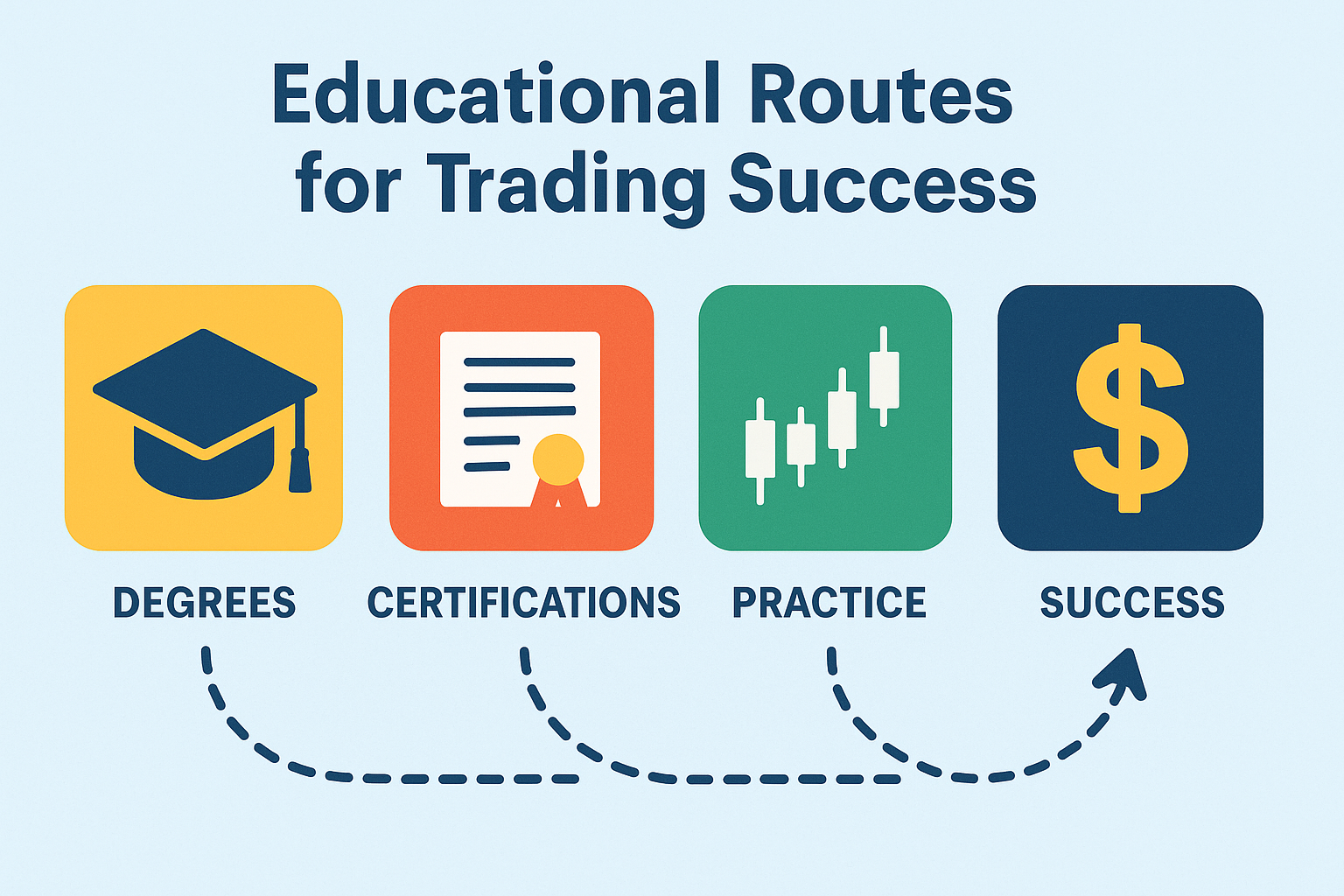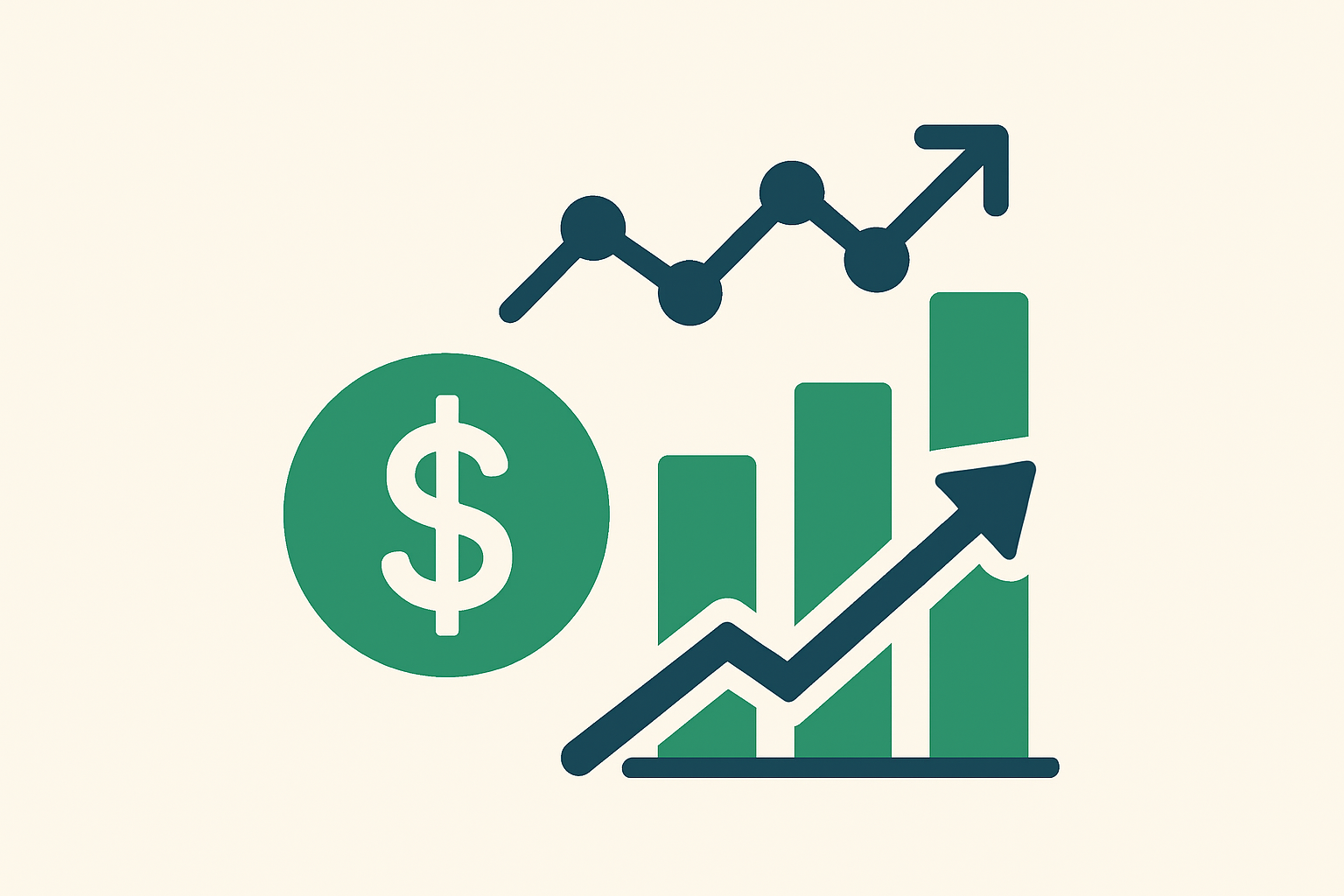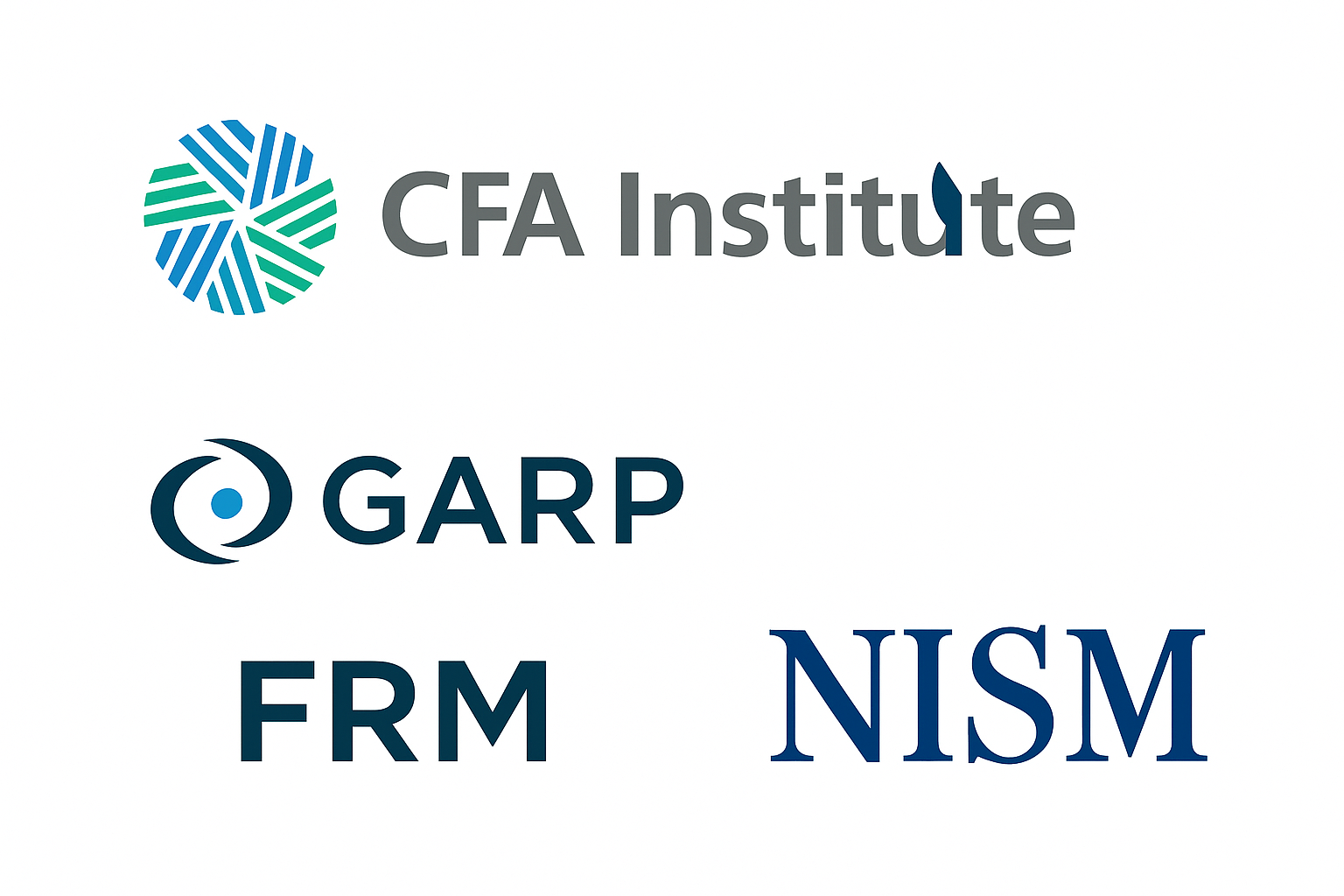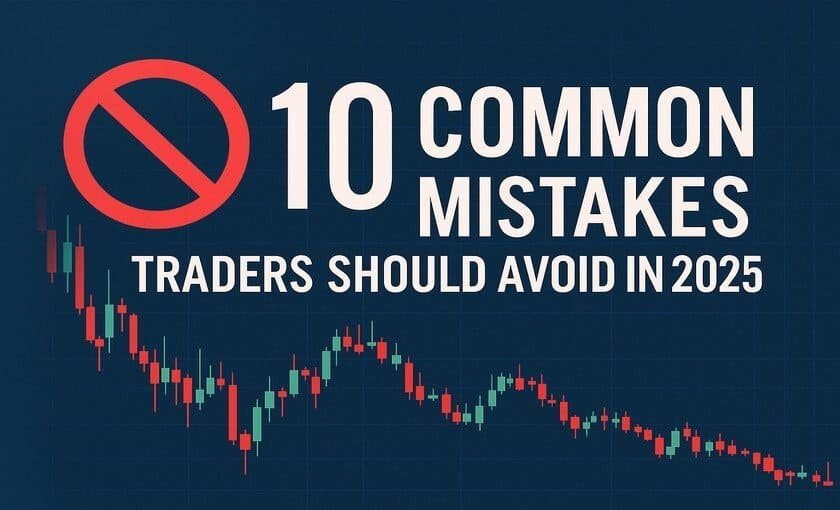Best Educational Routes for Trading Success in 2025
Educational routes for trading success in 2025 include structured finance or economics degrees, specialized stock market training, online trading classes, and hands-on practice with simulators. These routes give aspiring traders the knowledge, discipline, and practical skills they need to succeed in today’s fast-moving markets, making them the most effective paths for building a long-term trading career.

Educational routes for trading success
Why Education Matters in Trading
Trading is not just about buying low and selling high. It requires discipline, risk management, and a solid understanding of how markets move. Without the right education, traders often make emotional decisions that lead to losses. This is why structured educational routes for trading success are so important. They provide a roadmap for beginners and professionals to grow steadily, rather than relying on guesswork.
Top Educational Routes for Trading Success
1.Online Stock Market Courses
Online learning is one of the fastest-growing educational routes for trading success. Many global platforms and local providers offer classes on the online stock market, ranging from basics to advanced strategies. Online courses also include simulations, quizzes, and interactive sessions to test real-world knowledge.
2. Free Trading Classes and Resources
Free trading classes are valuable entry points for beginners who want to test the waters. Many institutes and online platforms provide introductory lessons covering candlestick charts, order types, and fundamental trading principles. While they may not be comprehensive, they provide a risk-free way to start learning.
3. Specialized Trading Institutes
Institutes focused on trading education provide targeted stock market lessons and structured paths for beginners. For example, the best stock market training institute in Chennai offers mentorship, live market practice, and industry-relevant training. Joining these institutes shortens the learning curve and provides direct exposure to real market scenarios.
4. Finance and Economics Degrees

Finance and economics degrees give traders a strong base in how money, markets, and investments work. These programs teach core subjects like market structures, portfolio management, and risk strategies. In 2025, traders who have academic training in these fields are better prepared to handle global volatility.
5. Mathematics and Statistics Programs

Trading in modern markets is data-driven. Degrees in mathematics, statistics, or computer science help traders analyze large datasets, understand algorithms, and design systematic trading strategies. These skills are especially useful in algorithmic trading and quantitative analysis.
6. Business and Management Studies
Business degrees are another strong route. They cover organizational strategy, financial planning, and leadership skills—all of which help traders manage their capital like a business. Business schools also expose learners to case studies that sharpen decision-making.
7. Certifications and Professional Programs

Professional certifications such as CFA, CMT, FRM, or NISM provide credibility and advanced market insights. These certifications help traders specialize in risk management, technical analysis, or portfolio strategy, depending on their chosen career path.
The Importance of Structured Educational Routes for Trading Success
Structured learning plays a major role in shaping a trader’s career. While many people try to learn trading on their own, the most reliable educational routes for trading success come through guided programs that blend theory and practice. A structured path, such as degree courses in finance or targeted trading classes, helps traders understand risk management, technical analysis, and behavioral finance. These elements provide a strong foundation that separates consistent traders from those who rely only on luck.
Combining Online Resources and Classroom Training for Trading Success
One of the smartest educational routes for trading success is combining online resources with traditional classroom training. Online stock market lessons and share market online class give flexibility, while offline institutes offer real-time mentorship and peer interaction. This hybrid approach ensures that learners gain both theoretical depth and practical exposure. By balancing free trading classes, paid certifications, and live simulations, aspiring traders can build a step-by-step roadmap that maximizes their chances of success in the markets.
Practical Learning: The Real Key to Trading Success
Textbooks and lectures explain the “what” and “why” of trading, but practice shows the “how.” Practical education includes paper trading, stock market simulators, and demo accounts. These tools let traders make decisions, analyze mistakes, and refine strategies without risking real money. Successful traders always pair theory with practical experience.
Building a Long-Term Career Through Education
In 2025, trading is no longer a side hustle. Many professionals are making trading a full-time career. Educational routes like structured courses, online stock market training, and mentorship programs are helping them build sustainable success. Instead of chasing short-term profits, educated traders focus on consistency, risk control, and long-term financial independence.
FAQs on Educational Routes for Trading Success
1. What are the best educational routes for trading success in 2025?
The best routes include online stock market training, finance degrees, economics courses, technical analysis programs, and structured classes offered by reputed institutes. Combining formal education with practical trading lessons helps you succeed faster.
2. Do I need a degree to become a successful trader?
No, a degree is not mandatory. However, degrees in finance, economics, mathematics, or business can give you a strong foundation. Many successful traders rely on certifications, online stock market and hands-on practice instead.
3. Which degree helps most in stock trading?
A finance or economics degree helps the most because it covers market principles, investment strategies, and risk management. Math or statistics degrees are also valuable for algorithmic and quantitative trading.
4. Can I learn trading through free courses?
Yes. Many platforms and institutes offer free trading classes, stock trading lessons, and demo accounts. Free trading classes are excellent for beginners but should be paired with structured training for professional growth.
5. What are the benefits of taking trading classes in Chennai?
Trading classes in Chennai offer live mentorship, local market insights, and structured modules for beginners and professionals. Institutes like Classroom of Traders are considered among the best stock market training institutes in Chennai.
6. Is online stock market training effective?
Yes. Online stock market training is flexible, affordable, and interactive. It allows you to learn technical analysis, risk management, and live trading from anywhere while practicing on simulators.
7. How long does it take to learn trading?
On average, it takes 6–12 months to grasp the basics and 2–3 years to gain consistency. The learning curve depends on your study route—structured courses often shorten the journey.
8. Are stock trading lessons for beginners worth it?
Yes. Beginner-friendly stock trading lessons explain concepts in simple terms, help you avoid costly mistakes, and build confidence before you trade with real money.
9. What are the advantages of free trading classes?
Free trading classes let you test your interest in trading without spending money. They also introduce you to essential topics like candlestick patterns, order types, and portfolio management.
10. What skills should traders develop for long-term success?
Traders should focus on risk management, technical analysis, fundamental analysis, emotional control, and financial discipline. Continuous learning is also key to staying competitive.
11. Can I become a trader without joining an institute?
Yes, you can self-learn through books, videos, and practice accounts. However, joining a best stock market training institute speeds up learning and provides mentorship, which many self-learners miss.
12. What is the role of practical training in trading success?
Practical training is crucial because trading is skill-based. Paper trading, simulators, and live market mentorship allow you to apply theories and refine strategies without risking heavy losses.
13. Are online share market classes better than offline ones?
Both have advantages. Online classes provide flexibility and global access, while offline classes offer face-to-face mentorship and networking opportunities. Many traders combine both.
14. What certifications can help in trading careers?
Globally recognized certifications like CFA, CMT, FRM, or NISM (India) add credibility and deepen your technical knowledge, making you more employable or confident as an independent trader.
15. Do trading courses guarantee success?
No course can guarantee profits. What they guarantee is skill-building, risk awareness, and structured knowledge. Success depends on discipline, practice, and consistent execution
16. Why should I join a stock market training institute in Chennai?
Trading Institutes in Chennai offer tailored programs for Indian markets, bilingual learning, and mentorship from experienced traders. Many also provide placement assistance for finance-related jobs.
17. What’s the difference between stock trading lessons and investing courses?
Trading lessons focus on short-term price moves, technical charts, and quick strategies. Investing courses focus on long-term wealth building, company analysis, and value investing.
18. Can I start trading with just online courses?
Yes, online courses provide the knowledge you need to begin. However, it’s best to combine them with demo accounts, mentorship, and continuous practice.
19. Are there trading courses designed for absolute beginners?
Yes. Many institutes and platforms offer beginner-friendly stock trading lessons that start from scratch—covering market basics, how exchanges work, and simple strategies.
20. How do I choose the right trading class for me?
Check the institute’s reputation, trainer experience, syllabus quality, reviews, and whether they provide practical sessions. Always prioritize hands-on learning and mentorship.













